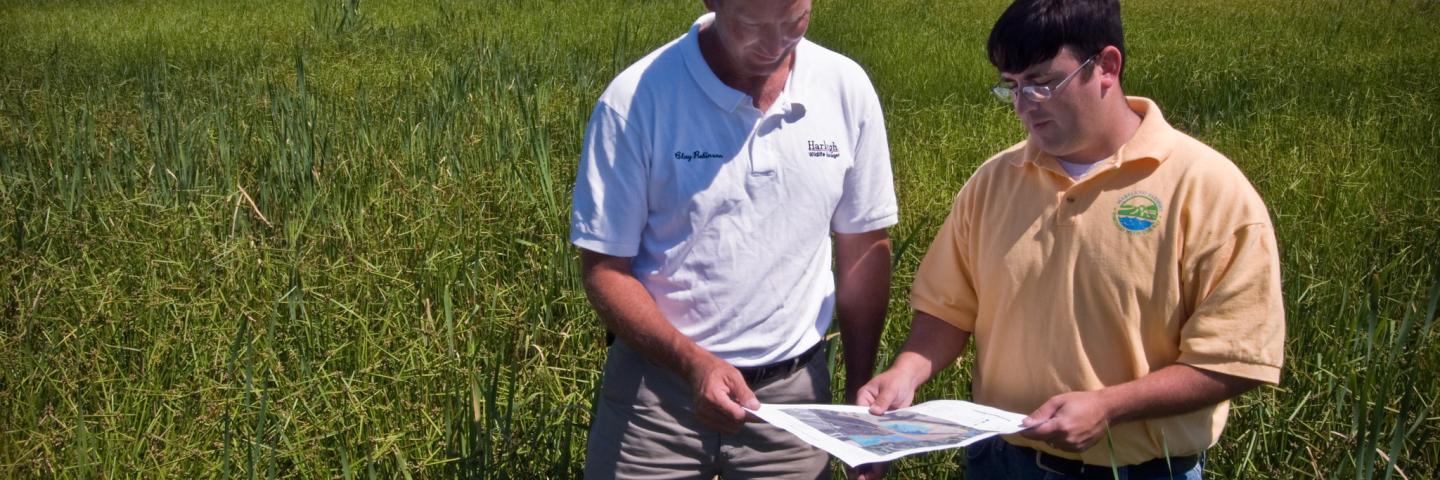
In the event participants do not agree with an NRCS decision, they are afforded various appeal rights. These appeal options will be detailed in the transmittal letter when you receive the preliminary technical determination.
Appeals Process for Highly Erodible Land Conservation (HELC) and Wetland Conservation (WC) Provisions
In order to maintain eligibility for most USDA programs, producers must comply with the conservation provisions, agreeing they will not:
- Produce an agricultural commodity on highly erodible land without an adequate conservation system;
- Plant an agricultural commodity on a converted wetland;
- Convert a wetland to make possible the production of an agricultural commodity.
NRCS is responsible for providing program participants technical assistance and determinations to help them comply with the provisions. Initial determinations are issued as Preliminary Technical Determinations.
If a preliminary determination is not appealed, it becomes final after 30 days.
If you wish to immediately address the concern of the Preliminary Technical Determination on the ground, such as pursuing wetland mitigation, you may waive your preliminary determination appeal rights in order to expedite issuance of a Final Technical Determination.
Frequently Asked Questions About the Appeals Process
What can I do if I disagree with the Preliminary Technical Determination NRCS issued me?
You may provide a written request for a reconsideration, or review of an adverse NRCS technical determination within 30 days of receipt. The reconsideration request shall describe the reasoning for why you feel the determination is not accurate and include supporting documentation, if applicable. A reconsideration is usually the most beneficial appeal option because it gives you an opportunity to have the basis for the determination explained to you in detail and provides for an initial or additional field visit which you will be able to participate in.
Another option you may pursue is mediation. Following a written request for mediation, a mediator will work with you and NRCS to improve communications, understand the relevant issues, develop alternatives, and reach a mutually satisfactory resolution. In general, mediation is usually more helpful in disagreements with program decisions rather than technical determinations.
What happens once I request a reconsideration of the preliminary determination?
NRCS will schedule a field visit with you to reconsider the technical decision. The purpose of this review is to gather additional information and discuss the facts relating to the preliminary technical determination. You are also invited to provide additional documentation to be considered for the final technical determination.
If the Final Technical Determination is no longer adverse to you, NRCS will issue the final decision to you. If the determination remains adverse, the determination will be further reviewed and issued by the NRCS State Conservationist.
What if I disagree with the Final Technical Determination?
You have additional appeal opportunities through the Farm Service Agency (FSA) County Committee or the USDA National Appeals Division (NAD). The request must be submitted in writing to the appropriate agency within 30 days of receipt of the Final Technical Determination.
- If you choose to appeal to the FSA County Committee, the Committee will conduct a hearing where you will identify the reason for your appeal. If they determine your appeal has merit, FSA will request a field and technical review from the NRCS State Conservationist and will issue the results to you following the review.
- If you choose to appeal to NAD, NAD will conduct a hearing affording you the opportunity to present testimony and/or documentary evidence which demonstrates the determination was in error. NRCS will share data from the Agency record supporting the technical determination. The NAD hearing officer will render a decision based on the hearing and evidence provided.
What happens once the appeal decision has been rendered?
If an adverse Final Technical Determination is upheld, FSA will process applicable program eligibility requirements if applicable. In cases of ineligibility, you will be informed of the opportunity to request a Good Faith Exemption from the Farm Service Agency or complete corrective actions to regain eligibility. If NAD finds the Final Technical Determination was not accurate, NRCS will reissue the technical determination reflective of the decision.
Additional Information: Code of Federal Regulations
Visit these eCFR links for the applicable Regulations of the Department of Agriculture.
NRCS Appeal Procedures
7 CFR Section 614 sets forth the informal appeal procedures under which a participant may appeal adverse technical determinations or program decisions made by officials of the Natural Resources Conservation Service (NRCS)
Highly Erodible Land Conservation and Wetland Conservation
The purpose of Code of Federal Regulations (7 CFR Part 12) provisions of this part are to remove certain incentives for persons to produce agricultural commodities on highly erodible land or converted wetland.
December 2018 Interim Final Rule
Highly Erodible Land and Wetland Conservation, Rule by the Agriculture Department on 12/07/2018 (7 CFR Part 12).

